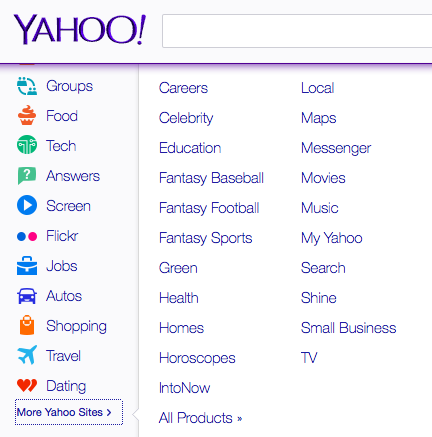Where Yahoo Might Again Compete In Search: Mobile
Kara Swisher on Friday broke the news that Yahoo was working on two internal (no longer) secret initiatives to get Yahoo back into organic and potentially paid search and thereby separate from Microsoft. Yahoo CEO Marissa Mayer has been critical of the Search Alliance with Bing and its impact on her company. The Search Alliance […]
 Kara Swisher on Friday broke the news that Yahoo was working on two internal (no longer) secret initiatives to get Yahoo back into organic and potentially paid search and thereby separate from Microsoft. Yahoo CEO Marissa Mayer has been critical of the Search Alliance with Bing and its impact on her company.
Kara Swisher on Friday broke the news that Yahoo was working on two internal (no longer) secret initiatives to get Yahoo back into organic and potentially paid search and thereby separate from Microsoft. Yahoo CEO Marissa Mayer has been critical of the Search Alliance with Bing and its impact on her company.
The Search Alliance deal, negotiated by Mayer’s predecessor Carol Bartz — Scott Thompson is like the William Henry Harrison of Yahoo — is pretty much a failure for Yahoo. It has benefited Microsoft and helped Bing to grow share, but mostly at Yahoo’s expense. Google has essentially been untouched by the Alliance.
Putting aside any legal or contractual obstacles, Danny Sullivan expressed skepticism that Yahoo could be competitive in search again. I think that’s true on the PC. But there might be another arena where Yahoo could succeed — in mobile.
While Yahoo probably couldn’t beat Google in straight up mobile search the company could build out additional verticals with a search component. Local comes to mind in particular but this would potentially apply to any of the verticals featured on the Yahoo homepage:
With the right content and user experience, Yahoo could generate new “search” usage and ad revenue from mobile. Though Google is widely used in mobile, basic “search” is generally not the preferred way to find things. Take for example the following data from Placed and Cars.com about how smartphone users look for price and product information while on auto-dealer lots.
Search is there but it’s a fourth choice. Accordingly search is far less formidable on smartphones than it is on PCs. If Yahoo were to go “all in” on mobile and develop a range of compelling experiences and apps it could generate additional search traffic and targeted ad inventory in a vertical or specialized context.
I’m not saying any of this would be easy. (I don’t know what the Yahoo-Microsoft Search Alliance contract says about mobile.) Quite the contrary, it would be enormously challenging to do it all well. But there is an opening here for Mayer and company.
Postscript: I neglected to discuss above how Aviate, the intelligent homescreen Yahoo acquired, might also further this mobile search objective. In my original post on the acquisition this is what I said:
In April last year, I suggested that Yahoo pursue a similar “home” strategy on Android. The Aviate acquisition now gives the company that opportunity. Why not maintain Aviaite but with Yahoo branding (e.g., “Yahoo Home/screen”)? The company could also integrate a Yahoo search box into Aviate, effectively “colonizing” Android for Yahoo search.
Aviate or “Yahoo Home” would potentially turn Android (Google) devices into Yahoo devices. And it would probably be more widely adopted than Facebook Home because it surfaces rather than buries or hides apps as Facebook Home did. Overall, Aviate is much more useful than Facebook Home.
Contributing authors are invited to create content for Search Engine Land and are chosen for their expertise and contribution to the search community. Our contributors work under the oversight of the editorial staff and contributions are checked for quality and relevance to our readers. The opinions they express are their own.
Related stories
New on Search Engine Land

